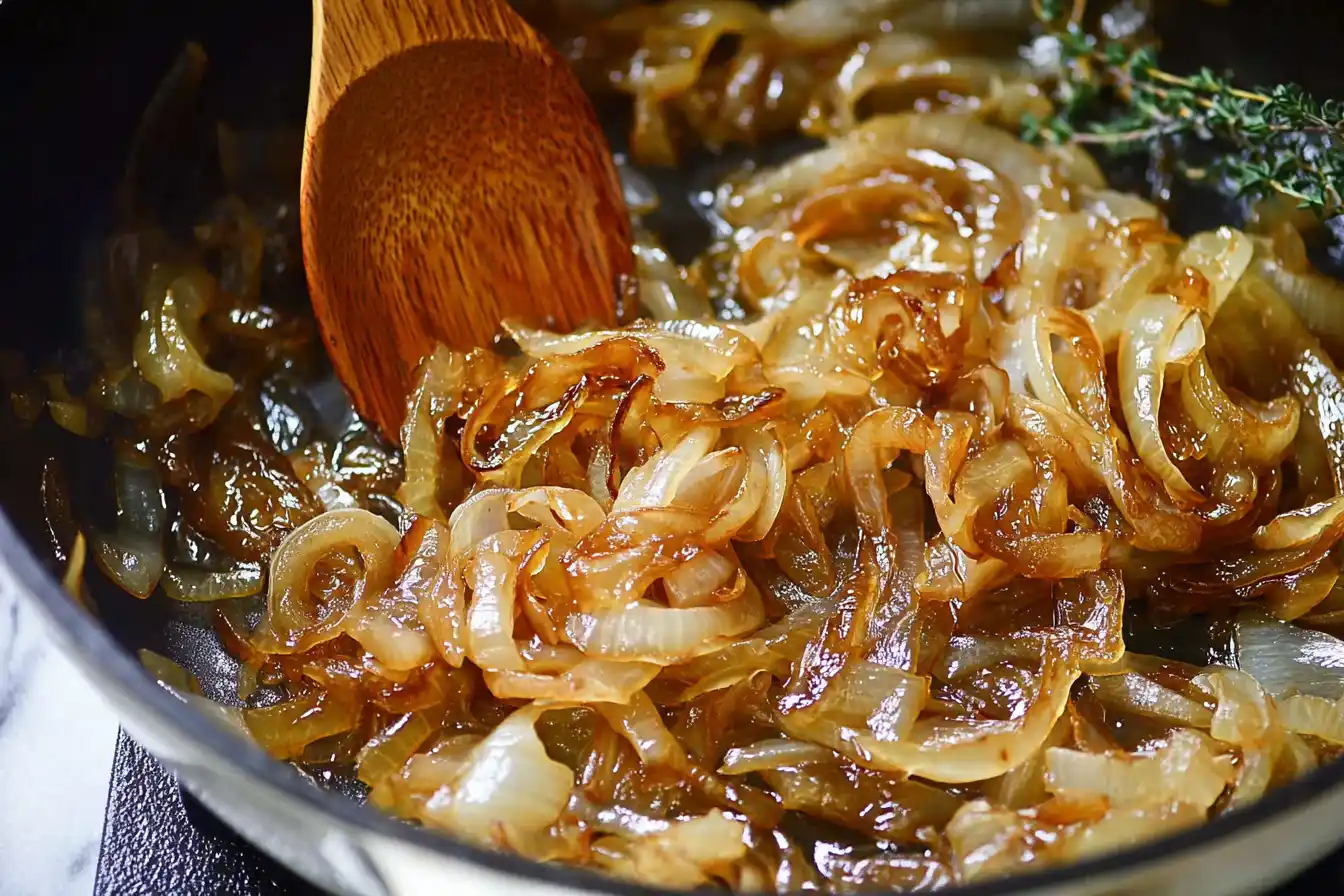Caramelized onions are your ticket to transforming simple meals into comforting, flavor-packed dishes. With just onions, butter, and a little patience, you’ll unlock layers of sweetness and umami that taste like you’ve been cooking for hours. My first time making caramelized onions was purely accidental—I was trying to sauté them and got distracted. When I returned, I found this deep, golden magic in the skillet. Since then, I’ve made them by choice, not by chance. Whether spooned over toast or stirred into pasta, these golden ribbons bring the wow.
Why You’ll Love This Caramelized Onions Recipe
This caramelized onions recipe is simple, affordable, and flavor-packed—here’s why you’ll keep coming back to it:
- Mouthwatering Depth: They add rich, nutty sweetness to savory dishes.
- Beginner-Proof Method: Minimal ingredients and no special skills required.
- Versatile Pairing: From breakfast toast to steak dinners, they shine anywhere.
- Budget-Friendly: Just a few onions and pantry staples create gourmet-level flavor.
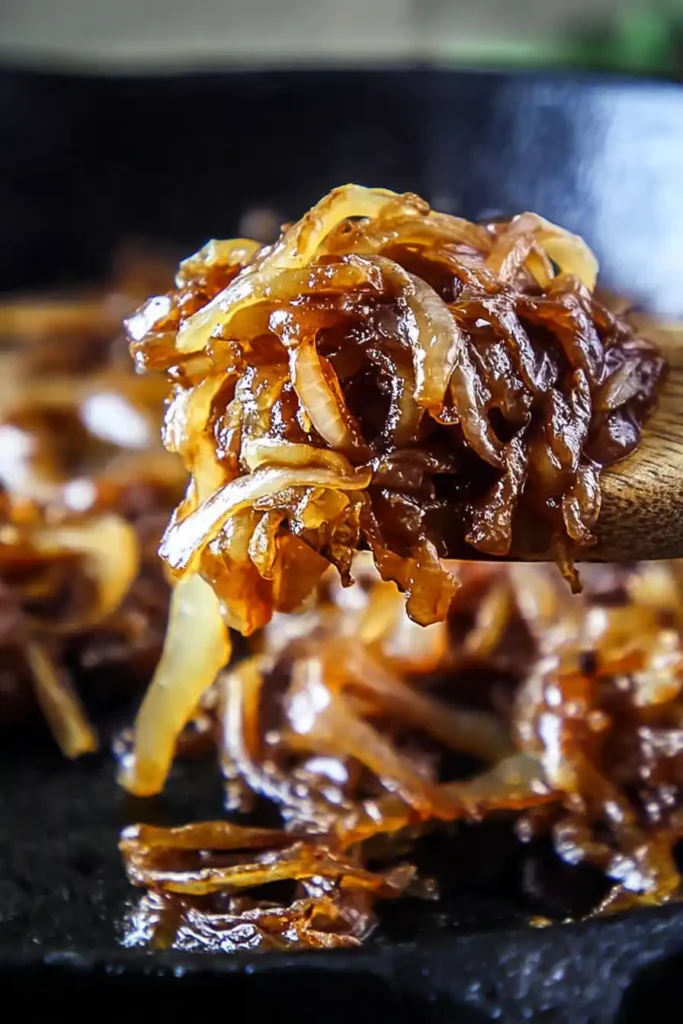
History and Fun Facts About Caramelized Onions
The journey of caramelized onions stretches across cultures and cuisines:
- Ancient Staple: Onions have been used for over 5,000 years, prized for both nutrition and flavor.
- French Kitchen Favorite: They’re the heart of traditional French onion soup.
- Science at Work: Caramelization involves the Maillard reaction, enhancing umami.
- Chef’s Trick: Restaurants often use them to elevate burgers, steaks, and dips.
Key Ingredients in Caramelized Onions
These simple but powerful ingredients deliver big flavor in this caramelized onions recipe:
- Yellow Onions – Their natural sweetness makes them ideal for long, slow cooking.
- Butter and Canola Oil – A combo that adds richness and prevents scorching.
- Kosher Salt – Draws moisture from the onions and enhances flavor.
- Fresh Thyme Leaves – Infuses aromatic earthiness into every bite.
- White Balsamic Vinegar – Adds a touch of brightness at the end (optional).
How to Make Caramelized Onions (Step-by-Step Guide)
Follow these beginner-friendly steps to create perfect caramelized onions:
- Heat the Skillet: Melt butter with canola oil in a large cast iron or heavy-bottomed skillet over medium-high heat.
- Add Onions & Season: Toss in sliced onions, sprinkle with kosher salt and thyme. Stir for 5 minutes until they begin to soften.
- Lower Heat & Cover: Reduce heat to medium-low and cover with a lid. This helps onions steam gently while developing flavor.
- Stir Occasionally: Every 10–15 minutes, uncover and stir. If onions stick or darken too fast, add a splash of water or broth.
- Add Vinegar (Optional): In the last 10 minutes, stir in white balsamic vinegar for brightness.
- Cook to Perfection: Continue for up to 1 hour until onions are golden, jammy, and rich. Serve warm or store for later.
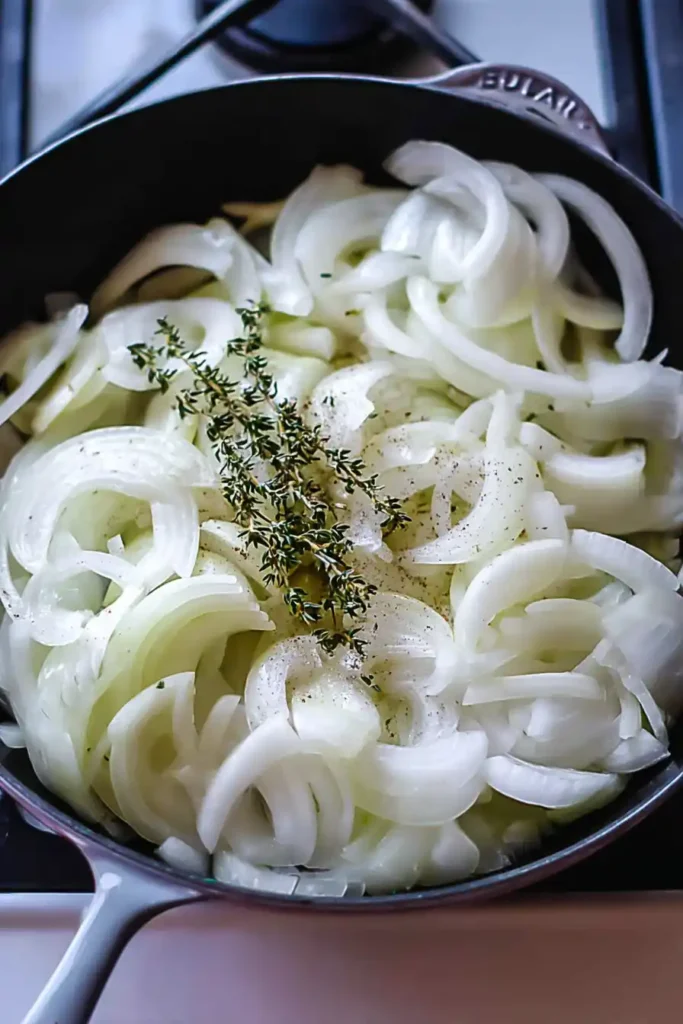
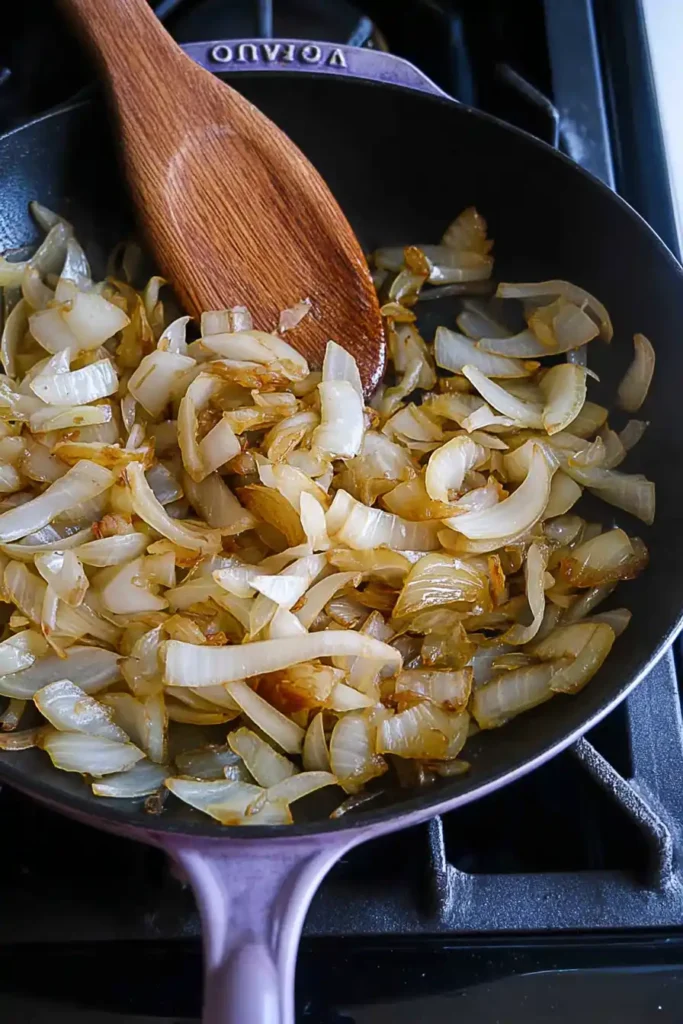
Caramelized Onions Tips and Twists
Here’s how to perfect your caramelized onions and play with flavors:
Top 5 Tips
- Use a heavy pan like cast iron to hold steady heat.
- Don’t rush—slow cooking brings out deep sweetness.
- Stir gently to avoid breaking down the onions too soon.
- Deglaze stuck bits with water or broth for extra flavor.
- Store in small jars or cubes for easy use all week.
3 Easy Variations
- Add Garlic: Stir in minced garlic during the last 10 minutes.
- Use Red Onions: For a bold, sweeter twist.
- Go Herbaceous: Swap thyme with rosemary or sage.
Storage, Reheating, and Make-Ahead Tips
Your effort won’t go to waste—these store beautifully:
- Storage: Keep cooled caramelized onions in an airtight container in the fridge for up to 1 week.
- Reheating: Reheat gently in a skillet over low heat, or microwave in short bursts.
- Make-Ahead: Caramelize a big batch and freeze in portions using silicone molds or ice cube trays for future use.
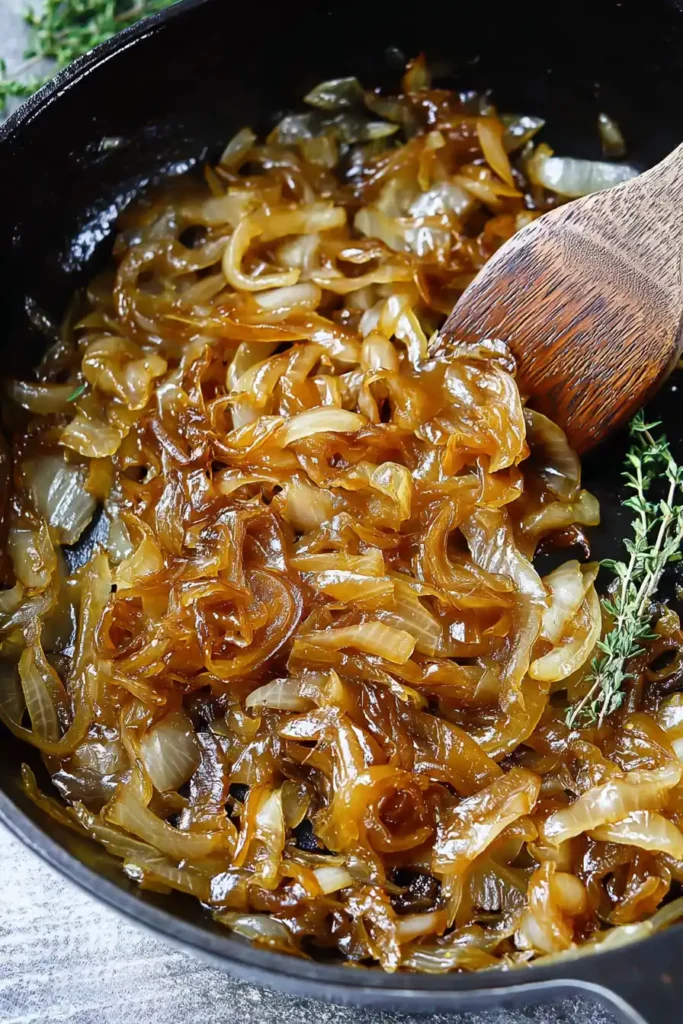
Serving Suggestions for Caramelized Onions
These golden onions make every dish better—try them with:
- Savory Breakfasts: Add to scrambled eggs or avocado toast with egg.
- Pasta Perfection: Toss into creamy sauces like chicken Alfredo lasagna.
- Gourmet Grilled Cheese: Layer into sandwiches for extra flavor depth.
- Pizza & Flatbreads: Add alongside cheese and arugula.
- Soups & Stews: Stir into rich broths or alongside Tuscan meatballs.
Frequently Asked Questions
Can I use red or white onions?
Yes! Red onions are sweeter, while white onions work in a pinch.
Do I need vinegar?
No, but white balsamic adds a touch of brightness that balances the richness.
How long can I store them?
Up to 1 week refrigerated, or 2 months frozen.
Can I make this vegan?
Yes—just use plant-based butter or more oil.
Why cover the pan?
It helps soften onions evenly while preventing them from drying out too soon.
Enjoy Your Caramelized Onions
Caramelized onions are a kitchen game-changer—simple, slow, and oh-so-rewarding. From sandwiches to soups, they add magic to everything they touch. Now that you know how to make them right, there’s no turning back. With your skillet, some onions, and a bit of patience, you’re on your way to making something truly special. Enjoy the golden goodness!
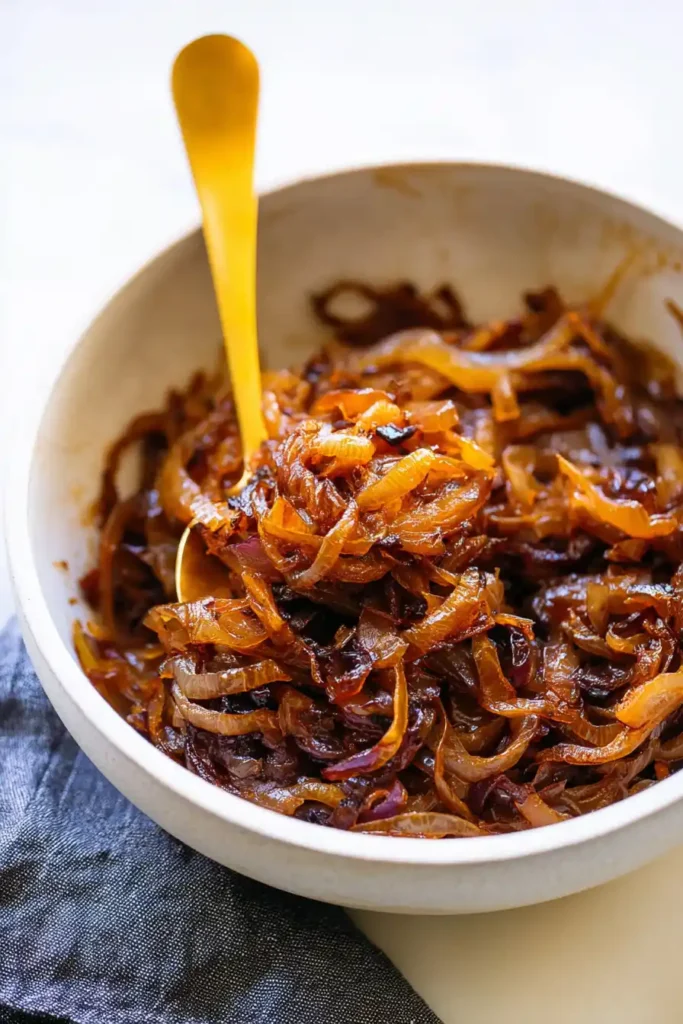
Explore More Recipes
Love the magic of caramelized onions? Try these delicious ideas next:
- For a bold pasta pairing, whip up our How to Make Carbone Spicy Rigatoni—spicy meets sweet like a dream.
- Need a cozy side? Our Easy Cheesy Hamburger Potato Soup gets a major upgrade with a spoonful of caramelized onions.
- For a brunch win, pair them with Grilled Chicken Wraps and a sprinkle of cheese.
- Don’t miss Crown Roast of Lamb—a luxurious dinner that pairs beautifully with these sweet onions.
Once you start using caramelized onions, you’ll wonder how you ever cooked without them.
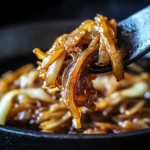
Caramelized Onions Recipe
Ingredients
- 2 tablespoons butter
- 1 tablespoon canola oil
- 3 large yellow onions peeled, halved, and thinly sliced
- 1 teaspoon kosher salt
- 3 sprigs fresh thyme leaves only
- 1 tablespoon white balsamic vinegar optional
- Splash of water or broth as needed for deglazing
Instructions
- In a large cast iron or heavy-bottomed skillet, melt the butter with canola oil over medium-high heat.
- Add sliced onions, kosher salt, and fresh thyme leaves. Stir to coat and cook for 5 minutes, stirring to prevent browning.
- Reduce heat to medium-low and cover the skillet with a lid.
- Cook onions for 45–60 minutes, stirring every 10–15 minutes.
- If onions begin to stick or crisp, add a splash of water or broth and scrape up the browned bits.
- Optional: Stir in white balsamic vinegar during the last 10 minutes of cooking.
- Onions are done when they’re deeply golden, jammy, and aromatic.
- Serve warm or cool and store for later use.
Notes
Calories: 140
Fat: 9g
Carbohydrates: 15g
Fiber: 2g
Sugar: 7g
Protein: 1g

